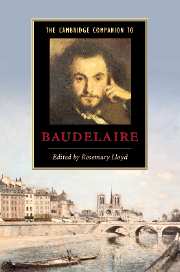Book contents
- Frontmatter
- 1 Charles Baudelaire, a life in writing
- 2 Baudelaire’s politics
- 3 Baudelaire’s poetic journey in Les Fleurs du Mal
- 4 Baudelaire’s versification: conservative or radical?
- 5 The prose poems
- 6 Baudelairean ethics
- 7 Baudelaire’s Paris
- 8 Baudelaire and intoxicants
- 9 Art and its representation
- 10 Music and theatre
- 11 Baudelaire’s literary criticism
- 12 Baudelaire’s place in literary and cultural history
- 13 A woman reading Baudelaire
- 14 Translating Baudelaire
- 15 The stroll and preparation for departure
- Afterword
- Appendix Titles of individual poems and prose poems referred to in the text
- Guide to further reading
- Index
- Index to Baudelaire’s works
- Series list
6 - Baudelairean ethics
Published online by Cambridge University Press: 28 August 2006
- Frontmatter
- 1 Charles Baudelaire, a life in writing
- 2 Baudelaire’s politics
- 3 Baudelaire’s poetic journey in Les Fleurs du Mal
- 4 Baudelaire’s versification: conservative or radical?
- 5 The prose poems
- 6 Baudelairean ethics
- 7 Baudelaire’s Paris
- 8 Baudelaire and intoxicants
- 9 Art and its representation
- 10 Music and theatre
- 11 Baudelaire’s literary criticism
- 12 Baudelaire’s place in literary and cultural history
- 13 A woman reading Baudelaire
- 14 Translating Baudelaire
- 15 The stroll and preparation for departure
- Afterword
- Appendix Titles of individual poems and prose poems referred to in the text
- Guide to further reading
- Index
- Index to Baudelaire’s works
- Series list
Summary
For it is truly, Lord, best witness in the world
That we might give to you of human dignity,
This ardent sob that rolls onward from age to age
And comes to die at the brink of your eternity!
‘Beacons’ (FM 25)[Car c’est vraiment Seigneur! le meilleur témoignage
Que nous puissions donner de notre dignité
Que cet ardent sanglot qui roule d’âge en âge
Et vient mourir aux bords de votre éternité!
‘Les Phares’ (OC i 14)]It might surprise readers who know only Baudelaire's dubious reputation as a sadist, a blasphemer, an addict or a poet of depravity that his literary and critical works are motivated in large part by a passionate ethical commitment. While his masterpiece, Les Fleurs du Mal, appears to overturn the conventional hierarchy of good and bad, his poetry does not literally celebrate criminals or prostitutes, nor does he truly condescend to women, the poor and the infirm. A closer look reveals that the poet frequently demonstrates compassion for people in the corrupt city of Paris, which he calls 'the gigantic whore' ['l'énorme catin' (OC I 191)]. The rebellious and afflicted are Baudelaire's beloved brothers and sisters, but he cannot state so directly.
In his essay on Edgar Allan Poe, Baudelaire bluntly denounces 'the great heresy' ['la grande hérésie'] of didacticism, art in the service of 'direct usefulness' ['l'utilité directe' (OC II 263)]. He rejects the idealised characters and moralistic lessons of the great Romantic poet and novelist Victor Hugo, while admiring his imagination (OC II 217-24).
- Type
- Chapter
- Information
- The Cambridge Companion to Baudelaire , pp. 87 - 100Publisher: Cambridge University PressPrint publication year: 2006
- 3
- Cited by



